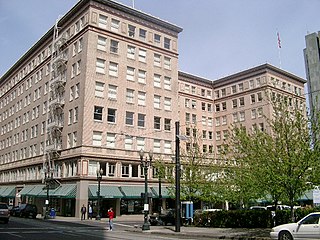Plaid Pantry is a chain of privately owned convenience stores based in Beaverton, Oregon, United States. Of 106 locations, one is in the Seattle, Washington area, eight are near Salem, and the remainder are in the Portland metropolitan area.

Meier & Frank was a prominent chain of department stores founded in Portland, Oregon, United States, and later bought by The May Department Stores Company. Meier & Frank operated in the Pacific Northwest from 1857 to 2006.

Lloyd Center is a shopping mall in the Lloyd District of Portland, Oregon, United States, just northeast of downtown. It is owned by Arrow Retail of Dallas. The mall features three floors of shopping, with the third level serving mostly as professional office spaces, a food court, and U.S. Education Corporation's Carrington College. Lloyd Center also includes the Lloyd Center Ice Skating Rink, which has become the main draw for the mall. There are currently no anchors in the mall. There are vacant anchor spaces left by Macy's, Marshalls, Nordstrom, and Sears. Junior anchors include Barnes & Noble and Ross Dress for Less.

The Meier & Frank Building is a fifteen-story, glazed terra cotta building located in downtown Portland, Oregon, across from the northeast corner of Pioneer Courthouse Square. The building is the former flagship store and headquarters building for the Meier & Frank department store chain, which was taken over by Macy's in 2006. In 2006–2007, the building's lower five floors were remodeled as a Macy's, while the upper eleven floors were renovated in 2008 into a luxury hotel known as The Nines. Macy's closed in April 2017 and the lower levels were rebuilt as office space.

Lipman's was an American department store chain based in Portland, Oregon. Founded in 1850 in Sacramento, California, the company was originally known as the Lipman–Wolfe & Company, named after the two founding partners: Adolphe Wolfe and his uncle, Soloman Lipman. It eventually grew to six stores in Oregon before they were rebranded to Frederick & Nelson in 1979. The 1912 building in downtown Portland that was the company's flagship store is listed on the National Register of Historic Places, as the Lipman–Wolfe and Company Building.

Camera World was a retailer of photographic equipment and photofinishing services based in Portland, Oregon, United States, and founded in 1977. It was an independent company until 2002, and then from 2002 to 2016 it was a brand of Ritz Camera & Image or C&A Marketing. In the mid-1990s, it was one of the largest mail-order retailers of photographic and audio equipment in the nation. The company's revenues totalled $80 million in 1998, of which $16 million were from online sales. Revenues grew to $115.7 million in 1999, and the company relocated its administrative offices and inventory to a new facility in Beaverton, Oregon, the following year. The company's only brick-and-mortar store, in downtown Portland, as well as its Internet business were sold in 2002 to Ritz Camera, which continued to operate them under the Camera World name. Ritz, in turn, was acquired by C&A Marketing in 2012, but retained the Camera World name as a Ritz brand, for both the store and the Internet business, until closure of the store. The store closed on January 21, 2016.

The Crescent was a small chain of department stores founded and based in Spokane, Washington. Once a subsidiary of Marshall Field & Company, the chain was sold to BATUS Retail Group in 1982. BATUS renamed the stores Frederick & Nelson, the company's Seattle, Washington division, in 1988. Frederick and Nelson eventually filed for bankruptcy and liquidated in 1992. At its peak, The Crescent operated seven department stores in Washington and Oregon, including three in Spokane.

Olds, Wortman & King, also known as Olds & King, was a department store in Portland, Oregon, United States, established under a different name in 1851 and becoming Olds & King in 1878, on its third change of ownership. The store was renamed Olds, Wortman & King in 1901; Olds & King again in 1944; and Rhodes in 1960. Moving several times within the downtown Portland area, the store settled at 10th & Morrison in 1910, in a large new building that remained in operation as a department store until 1974 and is now listed on the National Register of Historic Places. Since 1976, the building has been known as The Galleria.
The Hillsboro wireless tower was a wireless telegraph station south of Hillsboro, Oregon, United States. Located adjacent to what is now Meriwether National Golf Club, at the time it was the second tallest steel tower in the world after France’s Eiffel Tower. The tower was constructed in 1921 and was torn down in 1952.

The Pittock Block is a historic building in downtown Portland, Oregon, occupying a city block between SW 9th and 10th Avenues, SW Stark and Washington Streets, and west of O'Bryant Square.

Joseph Kaye Gill was an American retailer and publisher in the state of Oregon. A native of England, he came to the United States with his parents and settled in Oregon where he managed a bookstore in Salem. Later he entered the business and became the owner of the now-defunct J. K. Gill Company that operated in the Pacific Northwest as a book and office supply store.

Made in Oregon is a private company founded in Portland, Oregon, United States in 1975 by Portland businessman Sam Naito. The company is a gift retailer that specializes in Oregon-made products. It was originally owned by Norcrest China Company, an import business co-owned by Sam Naito and his brother Bill Naito, until Norcrest was reorganized as H. Naito Corporation in 1992.

Portland University was a private, Methodist post-secondary school in Portland, Oregon, United States. Founded in 1891 in a split from Willamette University, the school closed in 1900. The campus was located in what is now the University Park neighborhood and later became home of the University of Portland. The original campus building, West Hall, still stands and is listed on the National Register of Historic Places.
Norm Thompson Outfitters is a privately owned catalog and internet retailer based in Middleton, Massachusetts that was previously based in Hillsboro, Oregon, United States until September 2016. The Norm Thompson offices were closed and consolidated due to Bluestem's acquisition of their parent company, Orchard Brands, in July 2015. Founded in 1949 by Norman A. (Norm) Thompson as a mail order business, it grew to annual sales of $200 million before it was sold to Golden Gate Capital Partners in 2006. The company sells clothing, gadgets, furniture, kitchen items, and gift items from its namesake catalog as well as from its Solutions and Sahalie brands. John Difrancesco serves as president and chief executive of the 500 employee company.

The Stevens Building is a commercial and office building located in downtown Portland, Oregon, listed on the National Register of Historic Places. The 12-story building was designed by Whidden & Lewis. The design is similar to the Failing Office Building (1907) and Wilcox Building (1911), also by Whidden & Lewis. Construction began in August 1913 and was completed in 1914, with the building opening on May 1, 1914. The total construction cost was $375,000. The building is approximately 152 feet (46 m) tall.

The United States National Bank Building in downtown Portland, Oregon was designed by A. E. Doyle in a Roman classical style, and is listed on the National Register of Historic Places. The four-story building's first section, facing Sixth Avenue, was completed and opened in 1917. The building features a four-story Corinthian colonnade at its eastern end and makes extensive use of glazed terracotta. The interior is also decorated extensively with highly textured materials.

Henry Ladd Corbett was an American businessman, civic leader, and politician in the state of Oregon. He was born into one of the wealthiest and most influential families in Oregon. Corbett attended Harvard University and then returned to Oregon to manage family business interests. Over the years, he served as president of the Portland Chamber of Commerce and president of Portland Port Commission. He also represented Multnomah County in the Oregon State Senate, serving two terms as President of the Senate. He served as acting governor of Oregon twice in 1927.
Hoffman Construction Company is a privately held construction founded in 1922. It is headquartered in Portland, Oregon. It also has an office location in Seattle. With a revenue of US$1.4 billion in FY2017, Hoffman was the 4th largest privately held company in Oregon and SW Washington by revenue in FY2017. It was the second largest general contractor in the Portland metro area in April 2019.
William Alvin Massingill, also known as Billy Massingill or W. A. Massingill, was an American businessman and politician who served as state legislator for the state of Oregon. He served one two-year term in the Oregon House of Representatives as a Republican legislator, representing a large rural district in south-central Oregon. He also ran a general store, sawmill, and a wool shipping warehouse in Lakeview, Oregon, and was that town's postmaster for several years.

Joe Brown's Carmel Corn is a caramel corn shop in Portland, Oregon's Lloyd District, in the United States. The business was established in 1932 by George Brown and his son Joe, originally operating as a single store in downtown. The Brown family expanded the company by opening two additional stores in the city and another in Seaside by the start of World War II. The war halted production and stores remained closed until 1960, when George's daughter Betty Brown and her husband Gordon Kalk opened a single store in the newly built Lloyd Center. Their son, Lee, owned Joe Brown's from c. 1980 to 1992. Subsequent owners have included siblings Ron Ertler and Diana Ray, Marc and Ratha Chouinard, and Cyndee Kurahara. The current owner, David Ferguson, acquired Joe Brown's in 2019.
















